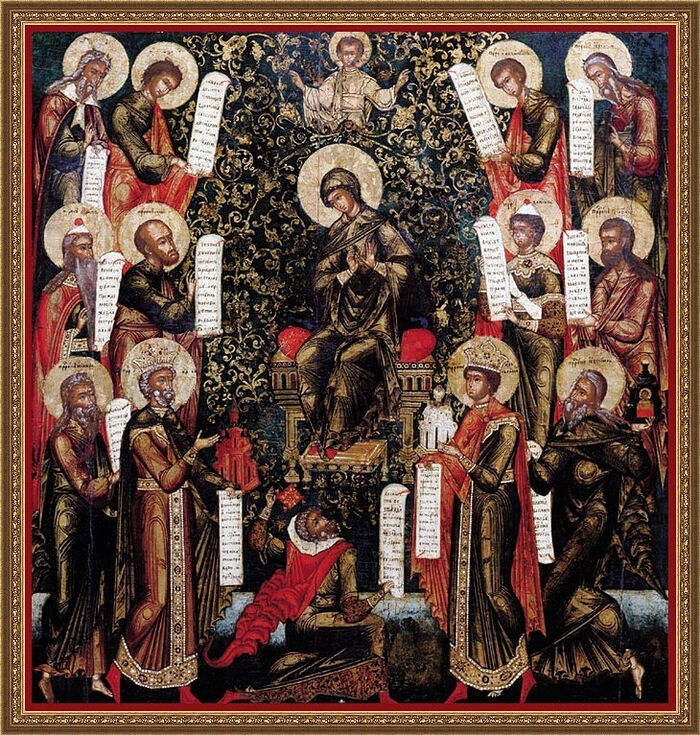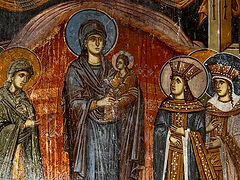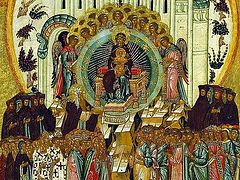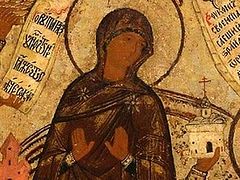From henceforth all generations shall call me blessed.
Lk. 1:48
These words of the Mother of God are read during the Divine Liturgy on the feasts of the Mother of God. We also hear them during our evening services. They contain profound prophetic significance.
At the dawn of Christian times, poor Virgin of low estate went from the small town of Nazareth to the hilly region of Judea to greet her relative, Elizabeth. And when she entered the house and greeted her, as the holy Evangelist Luke relates, And it came to pass, that, when Elisabeth heard the salutation of Mary, the babe leaped in her womb; and Elisabeth was filled with the Holy Ghost: And she spake out with a loud voice, and said, Blessed art thou among women, and blessed is the fruit of thy womb. And whence is this to me, that the mother of my Lord should come to me? (Lk. 1:41–43). Filled with the same prophetic spirit, the Most Holy Virgin said of herself: From henceforth all generations shall call me blessed.
Nothing of the natural order could have confirmed in her the hope that not only would she be well known, but that all generations would glorify her! Nothing earthly could have moved her to such a prophecy! The Spirit of God, Whose works she blessed in prayer, enlightened her mind, opened her heart, and moved her lips to utter what was preordained concerning her in heaven, and what the holy Universal Church accepted according to this predetermination concerning her.
During her earthly life the Most Holy Virgin was alien to glory and fled it. Even in the moment when she glorified God for having chosen her to become the Mother of the Lord, she sees herself as a humble handmaiden. And later, when people were elated with the divine words of her Son, when they glorified Him for the miracles He had wrought, when they triumphantly met Him, the Mother of God as if stood off to the side in those days of glory. She did not come to share in the glory of her Divine Son. But when He was being mocked, when He was being crucified, and stripped of glory, then the Mother of God was next to Him.
Divine grace itself revealed the glory of Sovereign Lady of the world. The Holy Gospel tells us about one moving incident. The Savior was surrounded by people, teaching them about the acquisition of the Kingdom of God. The people listening to Him thirstily drank in the words of life, just parched earth drinks in enlivening moisture. And then, like a thunderbolt from a cloud came the exclamation from the lips of a woman in that instant: Blessed is the womb that bare thee, and the paps which thou hast sucked! (Lk. 11:27). The unknown woman of course did not know that over thirty years ago, the Most Holy Virgin said to Elizabeth alone: All generations shall call me blessed, when Elizabeth proclaimed, Blessed art thou among women, and blessed is the fruit of thy womb. But how precisely this woman expressed and confirmed this prophecy that had come to pass—and she expressed it not only in her thoughts but even in words: Blessed is the womb. The unknown woman blessed the Mother of God, blessed the womb that had borne the Divine Teacher, and the paps that had fed Him. And look what came next. The Lord not only rejected the praise of His mother, but confirmed with the following words the rightness of what this sincere heart had done. He only showed that everyone can achieved blessedness if they will hear His word and keep it: Yea rather, blessed are they that hear the word of God, and keep it (Lk. 11:28). This was the first shown praise of the Mother of God, the first laudation in the presence of many of the one who became the Mother in the flesh to the extraordinary Teacher and Miracle Worker.
After the Lord’s glorious Ascension to heaven, the Mother of God was shown to be the chosen sun amidst the holy apostles. As we read in the Acts of the Apostles, These all continued with one accord in prayer and supplication, with the women, and Mary the mother of Jesus, and with his brethren (Acts 1:14). As we can see, the writer of the Acts distinguishes Mary, by name citing only her among the other women. The Mother of God becomes the meeting point—where the holy apostles went and before beginning their preaching, and where they returned after their gospel travels. They received a blessing from her on their apostolic labors and shared with her the joys and sorrows they experienced. They shared them with the one who carefully placed and kept in her heart all that had happened during the Savior’s earthly life (cf. Lk. 2:19). The preachers of the Gospel also received a reminder of the divine commandments, fortification in their labors, and consolation in their sorrows. Like a vessel that contained fragrant myrrh, which continues to be fragrant, especially after having been the vessel of the Divinity, the one anointed with the pleasant fragrance of divine grace becomes closer to people with her presence, her grace-filled prayer, and saving presence in the actions of the One who once lived in her bodily, and who both now and always lives in her, abiding in her and with her spiritually.
Even at the dawn of the Christian Church, believers understood the closeness of the Most Holy Virgin to God, saw and felt by experience her intercessions in heaven, and that is why they glorified her all-honorable name from the earliest times, called upon her in their prayers, and asked for her help. And since then to this day her divinely beautiful glory has shown, shines, and will shine. No heretical sophistry ever eclipsed her glory and never can, because the glory of the Mother of God is the work of God; divine Providence itself established it. Today we will not find a single Orthodox church, nor a single Orthodox soul for whom the Mother of God is not dear and close. She is our faith, our hope and joy, our prayerful intercessor.
However, dear fathers, brothers, and sisters, in blessing the Mother of God and asking for her mercies, we must think well and ask ourselves: Are we worthy to praise her, are we worthy of her love? In praising the Every-Virgin, do we preserve our own virginity, chastity, and purity? In glorifying her of profound humility, don’t we ourselves remain in our pride; aren’t we honored by the worm of self-opinion, ambition, and envy? In glorifying the Mother of God and our Heavenly Mother in this holy church, don’t we do the opposite at home? Don’t children insult the sacred names of their parents by not honoring them, by their inattention, or—God forbid—audacity, rudeness? Do the parents themselves fulfill their duties towards their children, to other people, as they should? Doesn’t the wave of passions drown out in our hearts the laudation of our lips? In the words of the great fourth century father of our Church, St. Gregory the Theologian, as a cloud hides the radiance of the sun’s rays, so does the sinner who does not want to recognize his sins and renounce them hide from himself the rays of God’s love and the mercy of the Mother of God.
Let us strive to be always true Orthodox Christians and worthy children of the Heavenly Mother, and the Mother of God will always be our faithful helper and fervent Intercessor.
“Rejoice… Virgin Mother… miracle heard throughout world.”
Amen.




